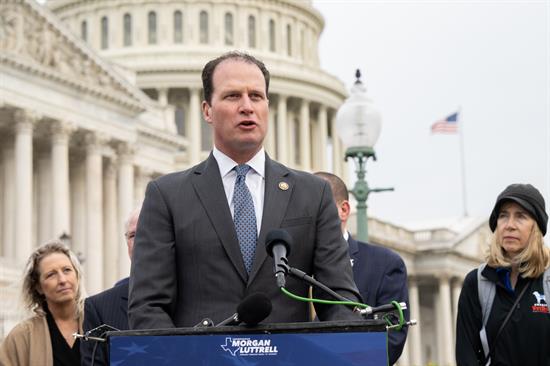
Pfluger Fly-By
Subscribe to my newsletter to get the latest news and updates from my office.
Press Releases
Pfluger, Arrington Lead Effort to Lower Energy Costs
Washington,
September 9, 2025
WASHINGTON, DC — Today, Congressman August Pfluger (TX-11) and Congressman Jodey Arrington (TX-19) led over 40 of their colleagues, including the entire Texas Republican Delegation, in sending a letter to Environmental Protection Agency (EPA) Administrator Lee Zeldin, recommending modifications to the 2026 and 2027 Renewable Volume Obligations (RVO) proposed rule. The recommendations offered by Pfluger and Arrington aim to lower fuel costs for Americans, maintain competitiveness in the liquid fuels manufacturing industry, and support President Trump and Administrator Zeldin’s mission of unleashing American energy. In part, the members wrote, "[we] commend your effective leadership in implementing President Trump’s mission to 'Unleash American Energy' by swiftly reversing the Biden administration’s all-out assault on domestic energy production...To maintain the viability of the liquid fuel manufacturing industry and keep energy costs low for American consumers and businesses, it is critical the EPA modifies its June 2025 proposed rule on Renewable Volume Obligations (RVOs) established under the Renewable Fuel Standard (RFS) for 2026 and 2027." Specifically, the lawmakers call for Administrator Zeldin to: · Align RVO volumes with market realities and ensure standards can be met with available domestic feedstocks; · Prevent the reallocation of regulatory compliance burdens to larger refiners when Small Refinery Exemptions (SREs) are granted; and · Maintain a 100% Renewable Identification Number (RIN) value for imported renewable fuels and feedstocks to preserve the competitiveness of American manufacturers Representatives Pfluger and Arrington were joined on the letter by Representatives Randy Weber (TX-14), Chip Roy (TX-21), Lance Gooden (TX-05), Kevin Hern (OK-01), John R. Carter (TX-31), Barry Moore (AL-01), Scott Perry (PA-10), Tom Cole (OK-04), Beth Van Duyne (TX-24), Nathaniel Moran (TX-01), Gary Palmer (AL-06), Nick LaLota (NY-01), Pete Sessions (TX-17), Stephanie Bice (OK-05), Dan Crenshaw (TX-02), Roger Williams (TX-25), Morgan Luttrell (TX-08), Brian Babin (TX-36), Jake Ellzey (TX-06), Clay Higgins (LA-03), Julia Letlow (LA-05), Morgan Griffith (VA-09), Michael Cloud (TX-27), Michael McCaul (TX-10), Wesley Hunt (TX-38), John Joyce, M.D. (PA-13), Brandon Gill (TX-26), Monica De La Cruz (TX-15), Craig Goldman (TX-12), Ronny L. Jackson (TX-13), Tony Gonzales (TX-23), Vince Fong (CA-20), Nick Langworthy (NY-23), John Moolenaar (MI-02), Pat Fallon (TX-04), Troy Downing (MT-02), Nicole Malliotakis (NY-11), Troy Nehls (TX-22), Keith Self (TX-03), Josh Brecheen (OK-02). See the full letter HERE or read the full text below. -- Dear Administrator Zeldin, We, the undersigned Members of Congress representing the most diverse and energy-rich producing regions in the country, commend your effective leadership in implementing President Trump’s mission to “Unleash American Energy” by swiftly reversing the Biden administration’s all-out assault on domestic energy production. U.S. refineries are critical to achieving President Trump’s goals to restore American energy dominance, as a strong and competitive liquid fuel manufacturing industry is vital to maintaining low gasoline and energy prices while limiting inflation. To maintain the viability of the liquid fuel manufacturing industry and keep energy costs low for American consumers and businesses, it is critical the EPA modifies its June 2025 proposed rule on Renewable Volume Obligations (RVOs) established under the Renewable Fuel Standard (RFS) for 2026 and 2027. When finalizing this rule, we urge you to consider the impact the refining sector has on the American economy, ensure the rulemaking maintains stability in the domestic fuels market, and sustain a strong and competitive industry that is vital to our nation’s energy security. In particular, we recommend minimizing RVO increases to avoid a large and expansive regulatory mandate on the industry. Overall, the liquid fuel manufacturing industry has made significant investments and spent billions of dollars to comply with the Renewable Fuel Standard (RFS) since its inception in 2005. A significant increase in RVO obligations would place an unsustainable burden on refineries and significantly increase costs on U.S. consumers and businesses. Additionally, we urge that Small Refinery Exemptions (SREs) do not reallocate regulatory burdens on larger refiners. SREs are essential to helping small refineries manage the regulatory costs of the RFS program, but it is critical these obligations are not transferred to other refineries. Reallocating these obligations would place an undue burden on companies that have invested billions of dollars to legally comply with the program and create significant disruptions in the fuel market. Finally, we recommend the EPA maintain a 100% Renewable Identification Number (RIN) value for imported renewable fuels and feedstocks. Domestic producers rely on global supply chains for cost-effective feedstocks and imports are critical to the viability of the domestic refinery industry. If the RIN value for foreign feedstocks is reduced, domestic fuel manufacturers will be at a competitive disadvantage compared to foreign producers, hampering President Trump’s strategy to unleash American energy. As such, we urge EPA’s final RVO rule to: · Minimize RVO volumes to be in alignment with market realities and to reflect standards that can be met with domestic feedstocks; · Prevent the reallocation of RIN obligations for any granted SREs; and · Maintain a 100% Renewable Identification Number (RIN) value for imported renewable fuels and feedstocks. We sincerely thank you for your strong support of the domestic liquid fuels industry and look forward to our continued work together to Make American Energy Great Again. Sincerely, |

